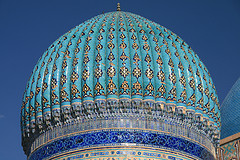Southern Kazakhstan: Holy Tombs and Ramadan
The devastating Soviet oppression of Islam in Central Asia has led – even nearly two decades after the collapse of the USSR and subsequent independence of the five Central Asian republics – to a religious apathy I’ve never before seen in predominantly (nominally?) Muslim countries. A case in point: it’s Ramadan right now, but you’d never know it in Kazakhstan, even in view of the holiest Muslim site in the country. In fact, we only figured out it was Ramadan by accident nine days after the Muslim holy month had started by comparing the dates with last year – nothing we’ve seen in Kazakhstan has given us the slightest indication that anyone is even aware that it’s on.
One of my (presumably attainable) ambitions is to spend some of Ramadan one year in a great Islamic city like Cairo or Damascus or Marrakesh or Lahore to see it come alive at dusk, but so far that has proven more elusive than I might have thought even though this is the fourth time in the past five years that we’ve spent all or part of Ramadan in a Muslim country. Coincidentally, the experience has actually become more liberal with each passing year. In Qatar, where all restaurants are closed during the day during Ramadan and you can be fined if caught drinking water in public while the sun is out (and where the fashion channel is not shown on TV for the entire month), in 2005 we had to sneak sandwiches into the DAGOC offices and lock ourselves in a meeting room at lunchtime to eat them. The next year, we had our own office and could eat openly in daylight hours there, but nowhere else around Doha. Last year in Istanbul, we ate pre-dawn kebabs after our flight from Rome arrived in the middle of the night, but were surprised to find some food places open during the day around the Blue Mosque and the rest of Sultanahmet. And now, in Turkistan, all the restaurants are open all day and everyone seems to be eating at lunchtime. This morning, our Muslim taxi driver donned a skull cap for our visit to a holy mausoleum and prayed in front of it, but still ate nuts and drank Pepsi all the while. A local student who befriended us today and invited us to lunch said Ramadan in Kazakhstan was optional, and that his brother was observing it but he wasn’t, even though he considers himself enough of a Muslim to be studying Arabic at university.
This absence of Ramadan aside, we’re now in the most Muslim area we’ve seen in Central Asia since our arrival in Osh, Kyrgyzstan, six or seven weeks ago. That’s not saying much though: while there are a few older men wearing typical Muslim clothes and some women in headscarves, it’s still a pretty progressive place for a small town; the younger Kazakh women (i.e. not just the Russians) are still in tight, fashionable clothes as in Almaty, beer is popular among locals at the cafes, and the nearby disco blares music until the wee hours of the morning.
 The aforementioned holy site is the Kozha Akhmed Yasaui Mausoleum, which was built in the 1390s and, despite never being finished, is both imposing and impressive, and dominates the small town of Turkistan. Having not yet been to Iran or Uzbekistan, this is the first time we’ve seen this type of monumental Central Asian tiles-and-domes Muslim architecture. And while I’m sure after visiting the historic Uzbek cities of Khiva, Bukhara and Samarkand in the next few weeks we’ll be pretty much sick of it, for now I think the Yasaui Mausoleum is an outstanding attraction and the best historic site we’ve seen in our travels so far this year.
The aforementioned holy site is the Kozha Akhmed Yasaui Mausoleum, which was built in the 1390s and, despite never being finished, is both imposing and impressive, and dominates the small town of Turkistan. Having not yet been to Iran or Uzbekistan, this is the first time we’ve seen this type of monumental Central Asian tiles-and-domes Muslim architecture. And while I’m sure after visiting the historic Uzbek cities of Khiva, Bukhara and Samarkand in the next few weeks we’ll be pretty much sick of it, for now I think the Yasaui Mausoleum is an outstanding attraction and the best historic site we’ve seen in our travels so far this year.
We’ve also visited some lesser known and less impressive but still worthwhile sites in the past few days, including the mausoleum of Yasaui’s father/teacher (it’s unclear which) near Turkistan, that of his mother, along with some other sites, at Sayram, and the ruined mud-brick city of Sauran. While none of these were particularly fabulous, and even combined are dwarfed by the majesty of the Yasaui Mausoleum, it’s great to be seeing sights again and enjoying travelling after all the downtime in Bishkek and Almaty. Plus you can hardly beat the off-the-beaten-track nature of Kazakhstan: on the train from Almaty to Shymkent a local women told us that we were the first foreign tourists she had ever seen, and even our student friend today said he had only ever come across two other foreign tourists, despite living his whole life in the shadow of the great mausoleum.
Tags: Asia, Central Asia, Kazakhstan, mausoleums, Ramadan, Travel, Turkistan
